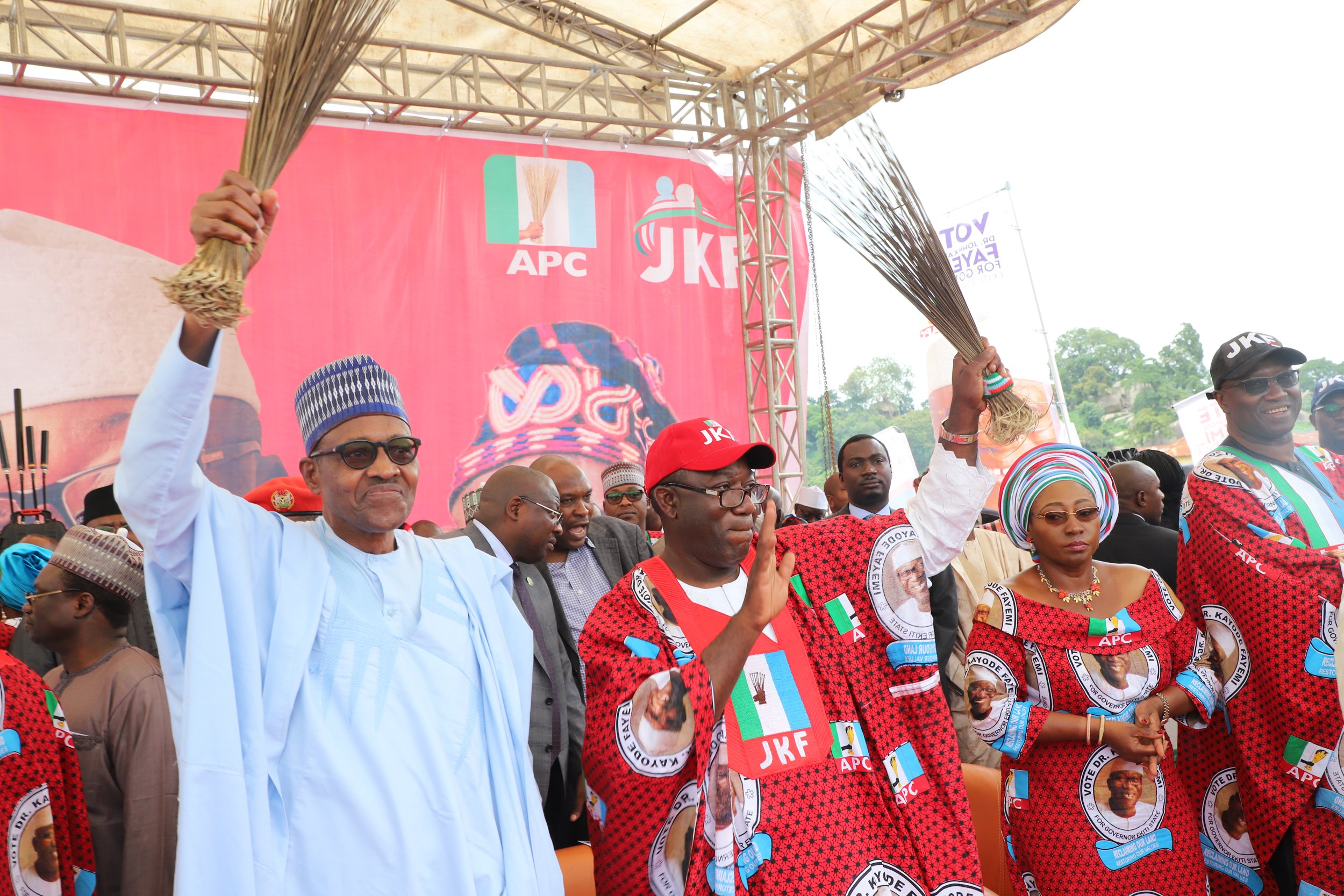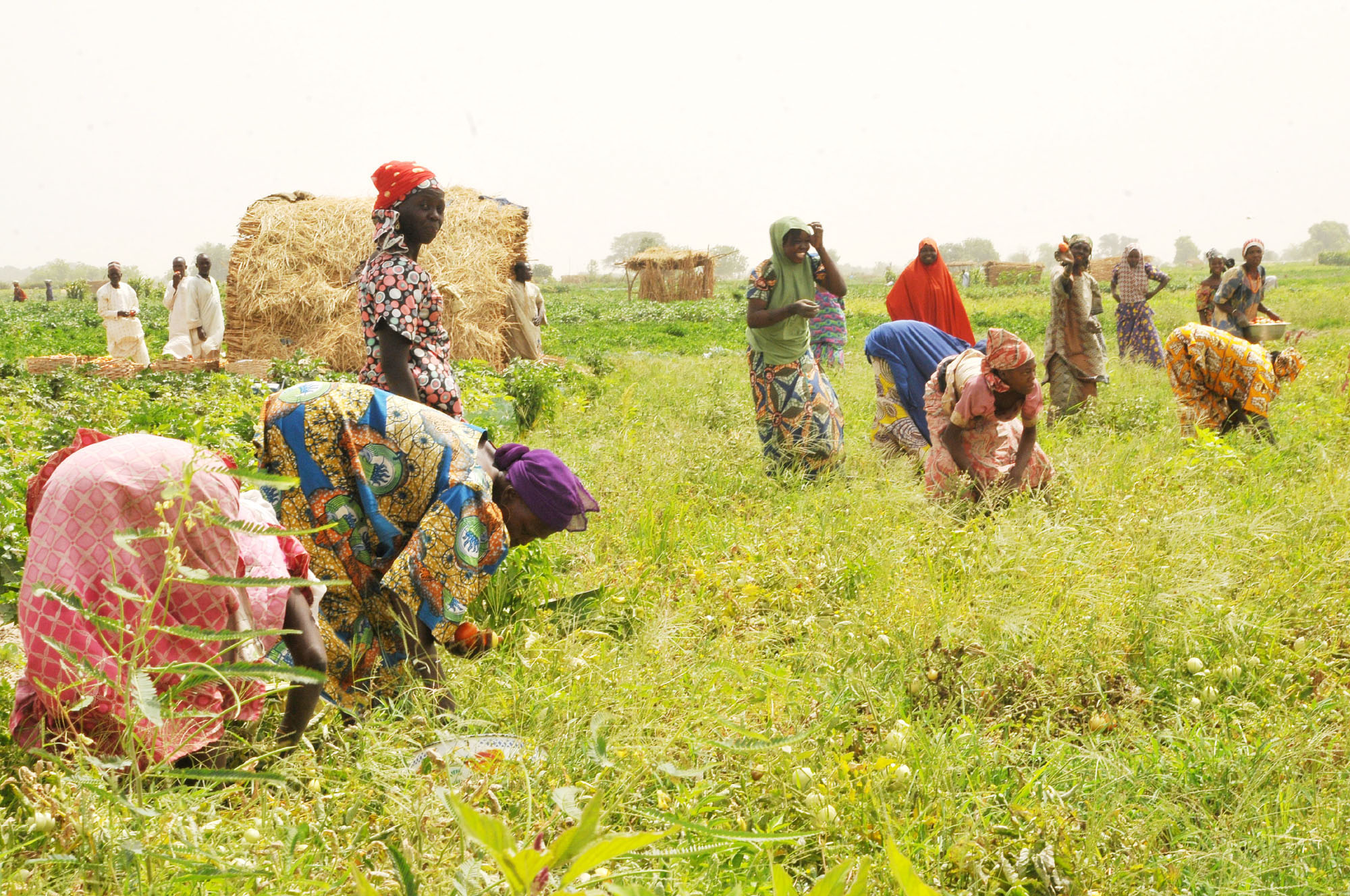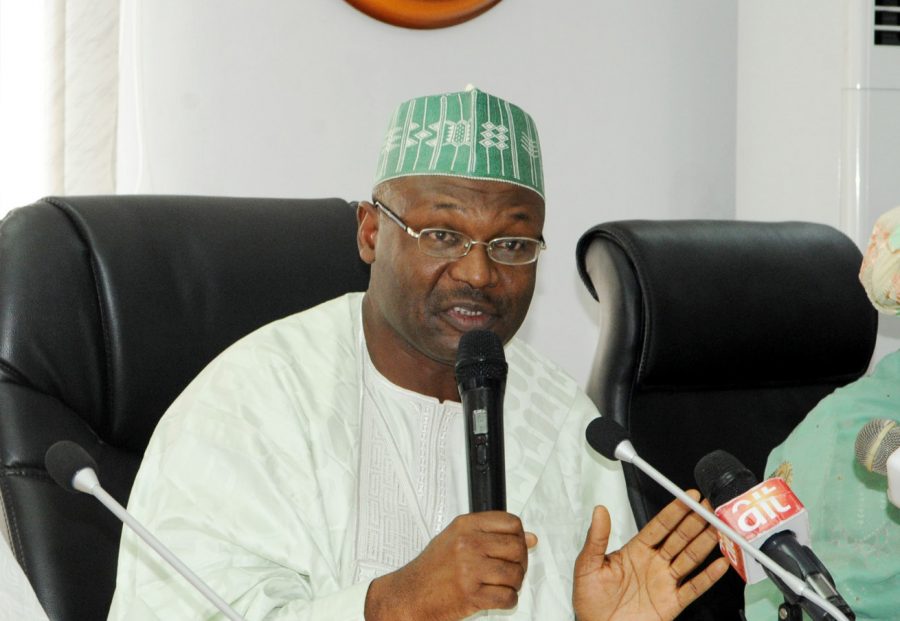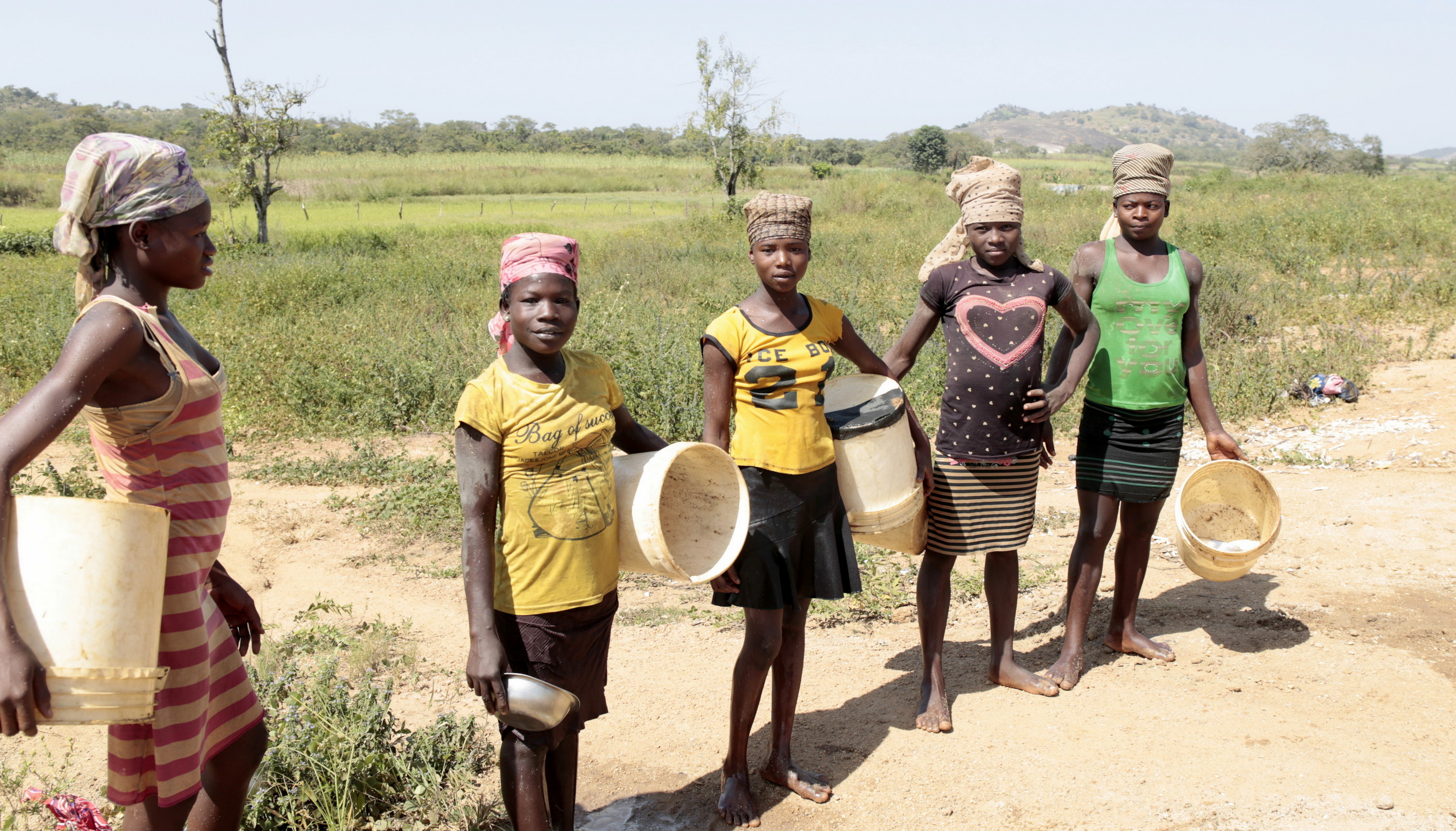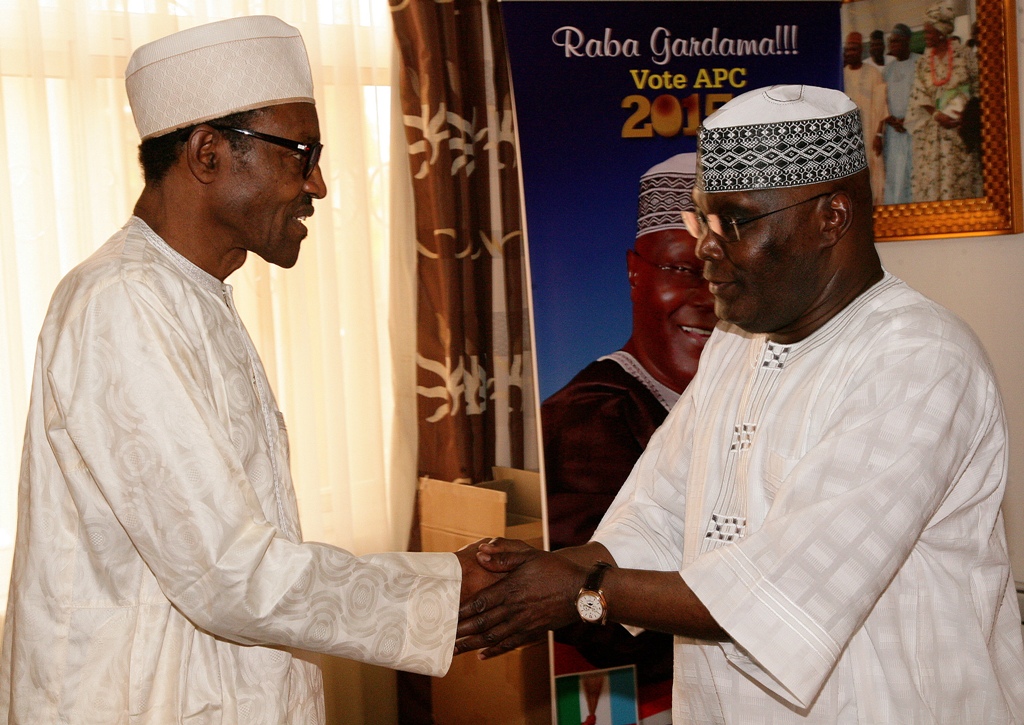(l-r) President Muhammadu Buhari; the APC Governorship Candidate, Dr. Kayode Fayemi; his Wife, Mrs. Fayemi and the SGF, Mr. Boss Mustapher as the President and the candidate acknowledged cheers from supporters during the Gubernatorial Campaign Rally for Fayemi and his running mate, Egbeyemi at the Oluyemi Kayode Stadium, Ado-Ekiti. Photo by Abayomi Adeshida 10/07/2018
BY ADEMOLA O. FASHIKU
If elections can be likened to heavyweight boxing contests, then the 2019 Presidential election will be a re-match of epic proportions. Already, the traffic we have seen across the political landscape, the overt and covert manoeuvres of the different gladiators – pretenders and contenders alike – and their cohorts foreshadow a set of compelling and interesting narratives that are worthy of consideration.
One of the early signs, it appears, is that the argument between “Change” versus “Continuity” will continue. Ordinarily, in the grand scheme of politics all over the world, candidates and political parties often strive to advantageously position themselves somewhere on the Change – Continuity spectrum, depending on the political setting and their permutations. Rarely, however, does it occur that challengers can successfully reduce the argument against incumbents to a monotonous chorus of “Change”, in order to bring the weaknesses and supposed poor performance of an incumbent into sharp contrast. Governor Ronald Raegan was, perhaps, the first Presidential aspirant to deploy this tactic to devastating effect in the US Presidential election of 1980. He asked Americans to decide whether they were better off than they were, four years prior, at the beginning of the Jimmy Carter administration. The result was very clear – Raegan won 49 out of 50 states in that election!!! Ever since, the debate during each election in America has always pivoted around the “Better-off/Worse-off” axis, with both sides equally staking their claims for a renewed mandate or a complete overhaul based on their assessment and/or justification of the then existing state of affairs in the country.
We were at a similar juncture in 2015 considering the nearly two-decade hegemony of the Peoples’ Democratic Party (“PDP”) from the onset of this Fourth Republic. Our initial previews of history will show that the last 6 years of this dominant era under (Ag.) President Jonathan posed a unique set of challenges for the country – testing the resilience of our existing institutions, capability of successful intra and inter-party transition of power, flagrant corruption, rampant insecurity (Boko Haram insurgency) and of course, economic stewardship (fuel subsidy controversy). The All Progressives Congress (“APC”), after its metamorphosis of shotgun alliances, successfully wrestled control of power at the centre from the PDP. Capitalising on GEJ’s perceived failings, personally and politically, the APC made the personality of President Muhammadu Buhari the spear-point of its electoral strategy. The rest, as they say, is history.
History, however, tends to repeat itself. Thus, it is quite ironic, if not paradoxical, that the APC today appears poised to play defence on the very same turf on which it had successfully mounted an electoral offensive against the PDP in 2015. In my view, we can measure how well the country has fared, and future prospects, when we compare the records of the immediate past and current administrations on the scorecards of economic stewardship, internal democracy and personality which were, and more or less remain the defining issues.
Advertisement
Economic Stewardship:
Firstly, the APC came into power touting a progressive ideology supported by a manifesto replete with lofty policy items e.g. eradicating corruption, economic liberalisation and diversification, restructuring etc. It is only fair to acknowledge the headwinds that assailed the government at the onset in the form of the global oil price slump and renewed Niger Delta militancy both of which adversely impacted government revenue flow and earning capacity. It didn’t take long for the economy to slip into recession.
There is, however, a convention of political wisdom that a good crisis should not be allowed to go to waste. How then did the APC manage this crisis? It would have been expected that with the momentum of its fresh mandate and associated political capital, the administration would have swung decisively into action to institute crucial and necessary reforms to reverse the course of the economic decline that had been evident since 2014. By comparison, President Barack Obama in 2009, within a month of assuming office, launched a bold and decisive economic programme via the Stimulus Bill and the financial bailout to combat the recession caused by the global financial crisis of 2008. In our case however, the government dilly-dallied for long on the appropriate monetary policy – whether to devalue the Naira and the approach to control and management of the Forex crisis – to combat the imminent threat to the economy. Needless to say, that this policy navel-gazing precipitated the recession. There have been some commendable initiatives taken by the government since then – launching the Economic Recovery & Growth Plan (“ERGP”), full implementation of the Treasury Single Account (“TSA”) policy among others – but vital points were lost from the pussyfooting of those early days, with the long-standing structural defects of the economy still largely unaddressed, the effects of which still resonate today. According to the recent World Poverty Clock report, Nigeria now has the unenviable status of harbouring the world’s highest population of poor people as a necessary consequence of the continually lagging economy.
Advertisement
Secondly, the APC government reneged on its progressive ethos in the management of the controversial fuel subsidy regime. As at today, after much pretence and denial, we know that the subsidy regime has not been eradicated contrary to the government’s promise. The finances of the NNPC and the remittances and disbursements to and from the Excess Crude Account are still shrouded in mystery. By all indications, as reported here and here, the pay-outs by the government for the under recovery rose above three hundred percent (300%) within a space of two months in this year alone. Factors responsible for this include the rising price of crude oil in the international market – which we should benefit from but cannot because we end up importing the finished product of what we produce. This is why, it should be all the more troubling that that the President so readily declined to assent the Petroleum Industry and Governance Bill (“PIGB”) which hitherto had languished in the National Assembly for seventeen years. By this singular act, the choice was made to maintain the unsustainable status quo and the power of political patronage wielded by unfettered access to and unregulated control of the oil and gas resources – the very bane of our country which this administration promised to address in its manifesto. Closely related to this is the still moribund state of our refineries, despite repeated policy postulations, which also compounds the subsidy problem.
As such, for as long as the administration has continued to blow hot and cold regarding its economic policy, the nation has continued to limp precariously along on the path economic sustainability and recovery contrary to the hopes and aspirations that ushered in this government.
Internal Democracy:
In his inaugural address, the President lamented the decline of leadership in our national life compared to the statesmanship and vision of our founding fathers. Pointedly, he excoriated predecessors who “…behaved like spoilt children breaking everything and bringing disorder to the house”. This was supposed to be a firm nod to the era of probity and unwavering rectitude being ushered in by the straitlaced and upstanding ex-general whose mere body language would send the miscreants in the polity scampering. How curiously then that within a matter of days, the discord and contradictions within the camp of the APC would be laid painfully bare for the whole world to see? The show of shame and ineptitude from both sides of the divide that dominated the (s)election of the principal officers of the National Assembly sowed seeds of discord within the government and the party which have now grown into wild oats that that the administration is still struggling to contain today.
Advertisement
Indeed, the APC as a governing party, has cut the picture of a house divided against itself and sadly, the nation has borne the brunt of it all for the worse. There is much to be said for the needless rancour and purposeless drift that has come to define this administration’s tenure most crucially at a time when the existential threats of our country should be addressed at full tilt. In case after case – from the mockery of the concepts of parliamentary majority, party supremacy and discipline when prominent actors within the APC made a Faustian bargain with the opposition to appoint the chambers’ principal officers; to the legislative brinksmanship over the budget padding controversy, to the brazen arm-wrestling over prerogative of Presidential appointments to name a few – the disarray has been on full display and it is quite stunning that all these were carried out without compunction or fear of any consequence. The same drama bedevilled the early days of the PDP under President Obasanjo, so what has changed if not that the problem merely changed names? These series of events in my view represent a staggering betrayal of trust and makes utter mockery of the President’s inaugural pontification. And of course, we know where the buck stops, or should, all things being equal.
Today, just as in 2015, we have seen mass migration across party lines as a fresh round of jockeying has commenced towards the elections. Allegations and counter – allegations about corrupt intent, moral turpitude, political oppression, heavy-handedness etc have dominated the airwaves and the press but let no one be fooled. We should not lose sight of the fact that, at the core, there is no overarching organising principle for political parties and politics at large in Nigeria save and except immediate personal interest. Our politicians’ callow pretentiousness will always be exposed by their greed and vaulting ambition regardless of how they masquerade as progressives or democrats. That this rings true for the APC today, considering the factors that propelled it into power, is a sad commentary on our political maturity, institutional deficiencies and total lack of vision and values as a country. The President rightly highlighted it but what has he done about the situation?
Personality
Winston Churchill said, “No part of the education of a politician is more indispensable than the fighting of elections”. Therefore, after twelve years of seeking the Presidency and almost four years at the helm, Nigerians cannot but wonder what it was all about for PMB to have so doggedly sought this office. What was the vision that propelled his unrelenting pursuit? Did he have a legacy in mind – a compelling case for making the nation better? I don’t think it would be unfair to say that President Buhari’s time in office, at best, has been a contradiction of sorts. Whichever way we choose to look at the record, the contrast between the idealism and reality of PMB offers compelling contrasts, some of which are quite sad.
Advertisement
Yes, we know elections are about stories and to an extent, the personalities of the candidates form part of the critical factors that determine the outcome. GEJ’s 2011 campaign effectively played this script and basically “had us at Hello.” The twist in the tale for both PMB and GEJ alike is that after enjoying immense goodwill and raising hopes, their respective tenures in the annals of history may amount to no more than inconsequential paragraphs of underwhelming legacies. Never before, at least from my own generational perspective, has so much collective hope and aspiration been reposed in persons who appealed to our faith and empathised with our plight only to end up dashing the hopes of millions who believed in them.
President Buhari’s calling card for this office was his incorruptibility. His second vital selling point was that, as an ex – General, we believed he was well qualified to tackle the security challenges facing the country. The economy was supposed to be the weak point, but expectations were high that, with the right team supporting, the challenges would be adroitly managed. What does the record show? The insurgency has been complicated by the rampaging herdsmen incrementally terrorising portions of the country. So, the problem has worsened. On corruption, as allegations or obvious cases of malfeasance have swirled uncomfortably close to the President’s inner circle, or even been exposed, the unmistakable body language has been one of condonation. Moreover, it appeared there was or has been a decidedly partisan slant to the anti-corruption crusade and sometimes obvious incompetence and acts of insubordination went without any repercussions. In all of these crises, the tone from the top has been of indecision, prevarication or rationalisation. What happened to the no-nonsense aura of this paragon of integrity?
Advertisement
Let us not be mistaken, leading a nation as diverse and complicated as Nigeria is not for the faint-of-heart. As such, the burden on PMB could only have been compounded by the episodes of ill-health that confronted him. It was a sad chapter in the life of this administration as governance virtually receded whist speculation, innuendo and misinformation filled the vacuum where we should have had sound policy and constructive engagement to move the nation forward. This was sad for the country considering the recent experience during the short-lived Yar’Adua presidency. As I previously wrote, we must never go back to such periods again.
If APC and PMB represented change as they vigorously campaigned, when we think in terms of “Key Man Risk” insurance, you only begin to wonder to what end this country was perilously pushed to the edge of the precipice by the yet undisclosed ailment. The further impact may also be viewed through the drawbacks on the government agenda. As speculated in some quarters, pressing problems could not be tackled with gusto as policy initiatives were dominated by guessing games within the president’s orbit not to mention the subterranean turf wars amongst competing power blocs. Mr. President’s tepid responses and dispositions to various issues have also heightened concerns about the pressures exerted on him by his duties and his capacity to continue to lead the charge. This could only be unfortunate given the severity of our problems.
Advertisement
In an increasingly complex, dynamic and interconnected world, we cannot afford “tunnel-visioned” leadership. Mr. President has rarely strayed from his comfort zone of an anti-corruption champion regardless of any issue he’s had to address. It appears his mind is configured to view every issue and analyse feedback to his policies and pronouncements – on issues ranging from Restructuring, insecurity, nepotist and clannish slant of appointments – as mere grumblings of “corrupt elements” who are not in his corner. Yet, anti-corruption sloganeering and posturing cannot be the silver-bullet to reverse the woes of decades of mismanagement that Nigeria has suffered. You cannot simply be defined by what you are against; the question is what vision is the President and his party leading us towards? Beyond the vision, how will we measure the progress we have made dealing with corruption, growing the economy and securing the nation for future generations?
In the words of Henry Clay, “it is not enough to be right to become President. You have to be right in the right way and at the right time. You have to be the right messenger to carry the right message”. In summary, the country needs significantly far more than this administration has offered in substance and form to tackle the hydra-headed, transgenerational challenges of its collective existence. There are fundamental and urgent questions to be asked and answered on how this nation should be structured and run for its continued survival and prosperity to be assured and handed down to future generations. These were the problems APC campaigned to address and begin to resolve.
Advertisement
My personal opinion is that once again, the country will take a measure of its health for good or ill in 2019 and decide to entrust the reins of power to whomsoever is deemed fit. We need people who are confident and capable to offer bold, radical leadership and vision, not folks who are merely comfortable with preserving status quo. Has this administration done enough to retain the electorate’s trust for a fresh mandate? If not, are there credible alternatives anywhere that we may look to? I believe the polity has not yet matured to the point of pursuing this vision and as such 2019 will only be a placeholder election whilst we build the necessary democratic infrastructure and coalitions to launch truly progressive reforms for the nation. That is a task to be undertaken via individual acts of civic responsibility on a consistent and continuous basis. Our salvation does not lie in any one man or personality because after all, democracy is a government of the people, by the people, for the people. We, the people must arise and take our destiny in our hands. That is when change truly begins because “Politics” as Ron Chernow said “boils down to stories we tell ourselves. And unfortunately, we tell ourselves different stories. Unless we know where we have been as a country, we don’t know where we are or where we are going.”
Fashiku is a Lagos-based legal practitioner
Views expressed by contributors are strictly personal and not of TheCable.
